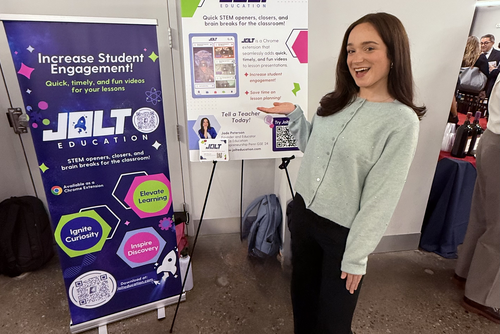The Pennovation Center was buzzing on November 7 as student founders, early-stage ventures, and alumni innovators gathered for the annual Penn Startup Showcase. The event brought together entrepreneurs across disciplines who have been refining ideas, testing early traction, and searching for collaborators who could help their ventures grow. For Penn GSE, the night spotlighted two entrepreneurs who embody the School’s spirit of design thinking and educational transformation: Celine Xu, a current student in the Education Entrepreneurship program and the COO of AskSia, and Jade Peterson, a 2024 graduate of the Education Entrepreneurship program and the founder of Jolt Education.

Xu’s path to AskSia began with her own challenges as an international student. When she arrived in the United States for undergraduate studies at New York University, she struggled to adapt to American academic expectations and frequently felt overwhelmed by language barriers, cultural differences, and complex coursework.
“I cried a lot during undergrad,” she said, recalling long nights spent translating readings word by word.
These experiences gave her a deep understanding of the pressures global students face, shaping the empathy and purpose behind AskSia. During her senior year, the platform's founder invited her to test an early version that relied on basic Q&A functions.
“We had two users, and one was my mom,” she said with a laugh.
At the time, ChatGPT had just launched, accuracy was low, and the platform was still evolving. Yet the team persisted and conducted more than two hundred interviews with students, sitting with them as they studied and closely observing their academic habits.
“We would literally sit next to students and watch how they learn,” Xu said.
Combined with her own background in communication, global marketing, and cultural insight, the platform began to grow.
As generative AI systems rapidly advanced, AskSia transformed from a simple Q&A tool into a multimodal, agentic AI study companion capable of analyzing numerous file types, processing complex workflows, selecting different models for different cognitive tasks, and providing structured academic support across disciplines.
“It is like having a whole team of tiny experts helping you,” she explained.
Today, AskSia serves more than one million students across North America, Asia Pacific, Latin America, and Europe. Xu describes the platform as a collective achievement, built by a team that spans five continents and includes students and professionals from diverse linguistic and cultural backgrounds.
“We are global in every sense,” she said.
She hopes the platform will soon become the top study companion for learners around the world, eventually extending beyond higher education to support lifelong learning. At the showcase, Xu was encouraged by the seasoned founders, faculty, investors, and technologists who were eager to engage with AskSia. “Walking into that room made me realize we are truly building something meaningful,” she said. The experience became a moment of affirmation, a reminder that AskSia had evolved into a serious venture operating alongside ambitious innovators across the university.

Peterson’s journey to Jolt Education began in a middle school science classroom in Des Moines, Iowa. While teaching online during the pandemic, she started each class with a short TikTok related to science, technology, wildlife, or feel-good stories that mirrored her students’ interests. What began as a small warm-up activity quickly turned into something powerful.
“Kids who never talked suddenly unmuted themselves to join the discussion,” she said.
Students who had been disengaged or quiet on Zoom came alive with debates about robotics, climate science, and new technologies. They connected ideas, built arguments, and engaged with one another in ways that transformed the classroom environment.
Peterson realized she had discovered a simple but effective way to spark curiosity, particularly in a time when teachers were competing with phones, games, and endless online distractions.
“Teachers are fighting for attention every minute,” she said.
That spark became Jolt Education, a platform that allows teachers to easily integrate short educational videos into their lesson slides through a Chrome extension. Peterson describes these short clips as “jolts” because of the quick burst of energy, focus, and curiosity they bring to students. Each video is paired with follow-up questions designed to promote critical thinking, evidence-based reasoning, and reflection.
“If a one-minute clip can start a meaningful conversation, that is a win,” she said.
Jolt has gained traction among middle school STEM teachers, and Peterson continues to teach part-time as a substitute and tutor in the School District of Philadelphia to remain connected to the students she aims to support.
“I will always teach in some capacity,” she said. “It keeps me grounded.”
She participates in innovation programs such as VIPX, the Wharton Innovation Fund, and the Transcend Fellowship while building her startup with a small team of Penn students and alumni.
At the showcase, Peterson found herself in conversation with founders across fields who saw potential uses for Jolt in medicine, engineering, and other STEM pathways, reinforcing her belief that student engagement is a universal challenge.
“Everyone kept saying, I wish I had this when I was in school,” she said.
The experience validated her mission to make it easier for teachers to capture students’ attention, particularly in an era dominated by short-form media. She hopes Jolt will become a trusted platform where teachers can also share their own video-based hooks, build modular lessons, and connect through a collaborative network.
“Teachers are some of the most creative people I know,” she added. “Jolt should help amplify that creativity.”
Standing together at the Penn Startup Showcase, Xu and Peterson represented the breadth of innovation emerging from Penn GSE. One builds advanced multimodal AI systems for global college students. The other creates video-based tools to help teachers ignite curiosity in K12 classrooms. Despite the differences in their ventures, both share a belief that education should be more connected, more accessible, and more attuned to how students learn today. Their work reflects Penn GSE’s commitment to empowering founders who turn lived experience into meaningful solutions and who build tools that honor the complexities of real classrooms and real students.
As Xu said, “Education has so many problems, but our generation can solve them if we design with empathy.” And as Peterson added, “If you can get a student curious, you can teach them anything.” And as the showcase demonstrated, their journeys are only just beginning.
Media Inquiries
Penn GSE Communications is here to help reporters connect with the education experts they need.








